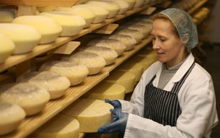Profession of Cheese Maker
 Career as a cheese maker is not familiar to many individuals. Cheese making is a skill which combines the science of fermentation and microbiology with the craft of producing the good and tasty product. The cheese maker usually converts milk into cheese. The milks of cow, goat, sheep and buffalo are used for cheese production, although worldwide cow's milk is most commonly used.
Career as a cheese maker is not familiar to many individuals. Cheese making is a skill which combines the science of fermentation and microbiology with the craft of producing the good and tasty product. The cheese maker usually converts milk into cheese. The milks of cow, goat, sheep and buffalo are used for cheese production, although worldwide cow's milk is most commonly used.
The cheese maker intends to reproduce product that demonstrates particular characteristics and accomplishes specific organoleptic requirements such as appearance, aroma, taste, texture every time it is made. In current, industrial cheese making factories the craft elements of cheese making is using automated, computer controlled cheese making processes. Cheese workers change milk into cheese. They produce several varieties of cheese from the hard, soft, and semi soft base products. Each of these types of cheeses uses different ingredients, which the workers blend, cook, and prepare in a different manner. Some of the work in cheese production is done manually. However, most workers use machines to produce the cheese. In some plants, workers are also responsible for maintaining, cleaning, and performing minor repairs on the machines.
Cheese makers usually guide other workers and supervise the use of machines. Workers operate machines that pasteurize and cook the milk. They also check the cooking temperature and mix the ingredients into the milk. Ingredients used in cheese making include dye or other coloring and rennet or other cultures. These cultures help to coagulate the milk into curd and whey. Curd is the solid protein part of the milk; whey is the water content. The curd is then separated from the whey and cooked until it reaches the right texture and firmness. Cheese maker helpers help out cheese makers in producing final product. In Cheese-making plants, many workers are employed to maintain and clean the machines. Other employees package the cheese, load it onto trucks, or drive delivery trucks to retail stores. Various designations in this industry are quality control inspectors, sanitary engineers, dairy technologists, and management workers such as plant supervisors and personnel workers.
Educational Qualification: To choose a career as a cheese maker, no formal qualifications compulsory. Training is usually provided on the job. In this profession, a small number of people do commence the Certificate in Food Processing (traineeships), which both contain six units specific to cheese making. Industry advice is to either obtain experience in the food industry, learning basic food handling procedures or start in a dairy factory as a junior and show enthusiasm and diligence. However, candidate can obtain the Certificate in Food Processing (traineeships), which both contain six units specific to cheese making.
Working Conditions In this occupation, there are limited opportunities. However, cheese consumption and consumer demand for specialty cheeses increases, factories are employing more staff. As cheese is a living product, cheese workers have to involve in all hours of the day and night. In smaller factories there can also be some heavy lifting involved when the cheeses are turned. Candidates, who are interested in this career, must be prepared to work in temperatures varying from 40 degrees to 4 degrees Celsius. Cheese makers also require to work effectively as part of a small team. An interest and an aptitude for microbiology, chemistry and math would also be helpful. This occupation offers a bright career.